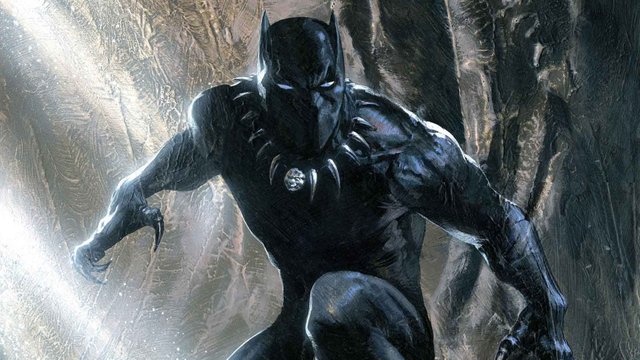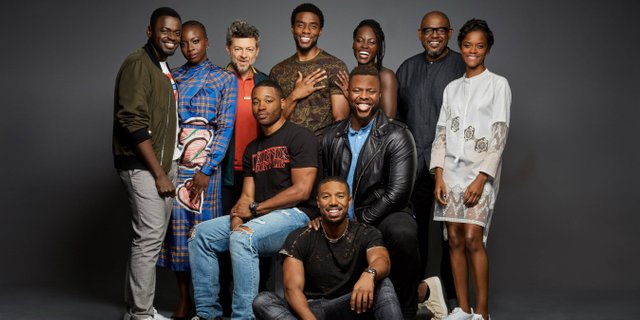Movie Review: Black Panther
***Contains mild spoilers****
Until now, whether they hail from the DC or Marvel cinematic universes, big-screen superheroes have traditionally been white dudes put on this earth (e.g. Superman and Thor, who each came from other planets) or fashioned by the U.S. military (à la Captain America and War Machine) to defend America from its enemies. Co-written and directed by Ryan Coogler, “Black Panther” is a radically different kind of comic-book movie, one with a proud Afrocentric twist, featuring a nearly all-black cast, that largely ignores the United States and focuses instead on the fictional nation of Wakanda — and guess what: Virtually everything that distinguishes “Black Panther” from past Marvel pics works to this standalone entry’s advantage.
Before we get carried away, let’s be clear: “Black Panther” is still a superhero movie, which means that it’s effectively conceived for 10-year-olds and all those who wish a film like this had existed when they were 10. Except that the latter category is potentially bigger than ever this time around (for a Marvel movie, at least), since there has never in the history of cinema been a film that allows an ensemble of black characters to take charge on a global scale quite like this — and many have waited their entire lives to witness just such a feat (the way that “Wonder Woman” was a hugely empowering game changer for women).

That alone would be reason to get excited, and Coogler makes good on the landmark project’s potential by featuring a predominantly black ensemble, casting some of the best young actors around — from Chadwick Boseman (who proved his dramatic chops playing James Brown, Jackie Robinson, and Thurgood Marshall in recent years) to Michael B. Jordan(even more buff, and twice as charismatic, than he appeared in the director’s two previous features, “Fruitvale Station” and “Creed”) — as well as such legends as Forest Whitaker and Angela Bassett. But historical significance aside, what superhero fans want to know is how “Black Panther” compares with other Marvel movies. Simply put, it not only holds its own, but improves on the formula in several key respects, from a politically engaged villain to an emotionally grounded final showdown.
Opening in the mythical kingdom of Wakanda, “Black Panther” effectively anticipates President Trump’s alleged comments about “shithole countries” whose refugees prefer the American way of life “to their huts.” Without disparaging the rest of Africa, Coogler and his crew suggest what the continent might have become had it never been stripped of its resources — and had those resources included highly advanced alien technology and ultra-efficient energy sources. Hidden from the world, Wakanda is home to the world’s most technologically advanced city, protected by a ruler with special powers (never fully defined, all-too-easily revoked) and a fearsome black panther costume.
Of course, Wakanda doesn’t really exist, but then, Europeans so exploited the continent that we’ll never truly know the full extent of what Africa could have taught the world. (No wonder Wakandans pejoratively refer to white people as “colonizers,” a not-unreasonable epithet that’s virtually certain to enter the national vocabulary from here.) As Prince T’Challa, Boseman plays the latest Wakandan leader to don the catsuit, a matte-black onesie that receives a nice upgrade courtesy of his tech-savvy sister, Shuri (scene-stealer Letitia Wright, whose irreverent delivery makes a welcome counterbalance to Boseman’s dead-serious attitude).
Truth be told, T’Challa is kind of a bore, even if the movie that surrounds him seldom fails to thrill: He’s prince of a utopian city with little interest in the fate of the world beyond his borders — until his father, King T’Chaka (John Kani), is assassinated during a bombing at the Vienna International Centre (a flashback to “Captain America: Civil War”). Though the Black Panther who made his impressive, hyper-acrobatic debut in that film is one and the same as the character seen here, Coogler humanizes him to such a degree that T’Challa doesn’t feel like a superhero so much as a deeply conflicted world leader — albeit one who must defend his title via brutal hand-to-hand bloodmatches (in a ritual that suggests a considerably more primordial, and decidedly anti-democratic, form of governance).

Wakanda owes its utopian status to a precious extraterrestrial resource called Vibranium that the rest of the world covets (it presumably sits somewhere between Kryptonite and Unobtanium on the periodic table of elements, and far out-values the diamonds and uranium for which Africa has been plundered over the past century). Halfway around the world, an MIT-educated former black-ops soldier named Erik Killmonger (Jordan, sporting a modified Basquiat haircut) waltzes into a museum and steals a misidentified Wakandan relic. (When a curator objects to the theft, he quips, “How do you think your ancestors got these?”)
Because Black Panther’s skills seem to rely more on gadgets than fantastical powers, his standalone Marvel outing actually feels more like a James Bond adventure than a conventional superhero movie at times — as in the subsequent set piece, which was clearly inspired by the Macau casino scene in “Skyfall.” Accompanied by two spear-wielding warriors (Danai Gurira and Lupita Nyong’o play members of the Dora Milaje, Wakanda’s elite female fighting force), a tuxedo-clad T’Challa attempts to go incognito while South African gunrunner Ulysses Klaue (a suitably thuggish Andy Serkis, ever the chameleon) makes ready to pass the pilfered treasure to a CIA agent (Martin Freeman, who may as well be playing 007 ally Felix Leiter).

An elaborate shootout ensues, conspicuously choreographed as a single-take “oner.” Unlike “Atomic Blonde” (the best use yet of that approach), the device calls a bit too much attention to itself here, cartoonishly inflating the action, rather than making it more realistic and relatable. Still, if it’s the cool factor Coogler is going for, the scene delivers, segueing into a stunning car chase across Busan, South Korea.
“Black Panther” may not have the most impressive action sequences or visual effects of any Marvel movie, but it boasts the best villains. As an arms dealer whose arm doubles as a Vibranium super-cannon, Klaue makes for a nasty henchman, while Killmonger keeps his cards up his sleeve until relatively late in the film but emerges as the most satisfying comic-book adversary since Heath Ledger’s Joker. Both characters have a ruthless anarchic streak, although Killmonger has more than just wreaking chaos in mind. He’s motivated by a feeling of deep political injustice, plus a “This time it’s personal” sense of vengeance, and he’s convinced that raiding the Wakanda’s stockpile of Vibranium could put genuine firepower in a worldwide black uprising.
It’s a compelling idea (enough to sway a key ally played by Daniel Kaluuya), and a reminder that throughout the African diaspora, the black-white power balance remains as it is courtesy of Jim Crow practices designed to keep minorities in check: persistent segregation, broken drug laws, racially targeted policing, disproportionately high incarceration rates — all of which are identified and indicted by Coogler’s truth-to-power script. Arm the oppressed, Killmonger passionately argues, and it won’t take a century for the system that produced “The Birth of a Nation” to grant a black artist the right to tell this kind of story — not that Coogler endorses the character’s lunatic ideas.
But he’s not about to waste the opportunity either. Rather than simply concocting another generic plan to save the world from annihilation, Coogler revives the age-old debate between Martin Luther King Jr. and Malcolm X — between passive resistance and the call for militant black activism. Think of it as “Black Panther vs. the Black Panthers,” except you can’t have a nonviolent action hero, which puts T’Challa in a strange position. It’s not quite clear what he stands for, whereas his independent-minded ex-girlfriend Nakia (Nyong’o’s character) has ambitious ideas about how Wakanda could help the world — which means it’s up to her to spark his engagement with the outside world.
While far more mainstream — and by extension, kid-friendly — than such blaxploitation classics as “Foxy Brown” and “Cleopatra Jones,” “Black Panther” upholds the same tradition of celebrating strong, assertive black women. At the end of a big rhinoceros battle, a male character submits to Gurira in the film’s single most iconic shot, while an earlier scene in which she tosses aside a bad wig ranks as the most gay-friendly Marvel moment to date.
In their print form, comic books have led the way in terms of representation and inclusivity, long empowering non-white, non-male characters in their pages. Although previous big-screen examples certainly exist — among them Wesley Snipes’ “Blade” and Will Smith’s “Hancock” — “Black Panther” celebrates its hero’s heritage while delivering one of Marvel’s most all-around appealing standalone installments to date. Going forward, Black Panther will join the ranks of the Avengers, further diversifying their ranks. In the meantime, it’s awesome to see Black Power celebrated in such a mainstream fashion.
-Maré Productions w/ courtesy from Peter Debruge [Variety]
Citation: Debruge, Peter. “Film Review: ‘Black Panther’.” Variety, 6 Feb. 2018.